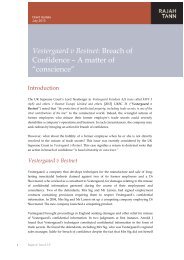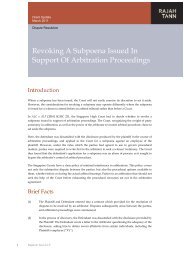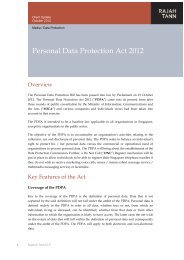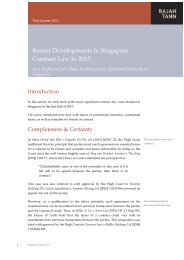Lawlines Volume 9 Issue 4 - eOASIS
Lawlines Volume 9 Issue 4 - eOASIS
Lawlines Volume 9 Issue 4 - eOASIS
You also want an ePaper? Increase the reach of your titles
YUMPU automatically turns print PDFs into web optimized ePapers that Google loves.
LawLinesVol 9 . <strong>Issue</strong> 4 • December 2007Around Rajah & TannRound Up – 2007 InPerspectiveFeature ArticlesTo Withhold Or Not ToWithhold – That Is TheQuestionAll Abuzz About GamesCorporate SocialResponsibility UnderThe New IndonesianCompany LawCase BitesLegislation Bitespayments directly to a sub-contractor and notthrough the main contractor, regardless of the maincontractor’s insolvency.CHG (‘contracting developer’) had signed andreturned an Order for Manufacture (‘OFM’) withSydenhams (‘sub-contractor’) for the design andsupply of timber. Subsequently, CHG, Sydenhamsand the proposed main contractor, Rybarn Limited(‘Rybarn’), entered into a three-way agreementthat CHG would pay Rybarn, who would thenpass the payments on to Sydenhams. Rybarnwent into insolvency whereupon CHG refused topay Sydenhams, claiming that Sydenhams was asub-contractor of Rybarn and cited the three-wayagreement as evidence of such relationship.The Court held that the OFM continued to bea legally binding contract between CHG andSydenhams. As such, CHG was liable to paySydenhams because there was a direct contractbetween the two (the OFM) which had never beennovated from CHG to Rybarn. The insolvency ofRybarn thus had no effect on this contract.ContractsRevised Contract Posted On Website NotEnforceableIn Douglas v Talk America, Inc (2007), the USCourt of Appeals for the Ninth Circuit held that aservice provider cannot change the terms of itsservice contract with customers by merely postingthe revised contract on its website. In order forcontractual changes to be enforceable, someform of notice to and consent from the customer isrequired. The Court held that parties to a contracthave no obligation to check periodically whether theterms have been changed by the other side, andcannot unilaterally change contract terms withoutobtaining the other party’s consent. The Court, indiscussing what would qualify for consent in theonline world, suggested that consent could beinferred in some cases where notice of changesto the contract is provided to customers (via emailor regular mail) and the customer continues to usethe service after receiving notice.page 27 of 44 pages | print | comments | close












